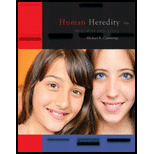
To determine: The way in which Rh incompatibility is involved in the hemolytic disease of a newborn.
Introduction: There are two types of Rh blood groups: Rh+ (have Rh antigen) and Rh- (do not have Rh antigen). Rh factor is a point of concern when the mother has Rh- and the fetus has Rh+ blood group. This condition can cause hemolytic disease of a newborn.
To determine: The Rh genotype of the mother in case of Rh incompatibility.
Introduction: There are two types of Rh blood groups: Rh+ (have Rh antigen) and Rh- (do not have Rh antigen). Rh factor is a point of concern when the mother has Rh- and the fetus has Rh+ blood group. This condition can cause hemolytic disease of a newborn.
To determine: The Rh genotype of the fetus in case of Rh incompatibility.
Introduction: There are two types of Rh blood groups: Rh+ (have Rh antigen) and Rh- (do not have Rh antigen). Rh factor is a point of concern when the mother has Rh- and the fetus has Rh+ blood group. This condition can cause hemolytic disease of the newborn.
To determine: The reason for the second child that has Rh+ antigen would be more susceptible to the attack from the mother’s immune system.
Introduction: There are two types of Rh blood groups: Rh+ (have Rh antigen) and Rh- (do not have Rh antigen). Rh factor is a point of concern when the mother has Rh- and the fetus has Rh+ blood group. This condition can cause hemolytic disease of the newborn.
Trending nowThis is a popular solution!

Chapter 17 Solutions
Human Heredity: Principles and Issues (MindTap Course List)
- Other than oil and alcohol, are there other liquids you could compare to water (that are liquid at room temperature)? How is water unique compared to these other liquids? What follow-up experiment would you like to do, and how would you relate it to your life?arrow_forwardSelection of Traits What adaptations do scavengers have for locating and feeding on prey? What adaptations do predators have for capturing and consuming prey?arrow_forwardCompetition Between Species What natural processes limit populations from growing too large? What are some resources organisms can compete over in their natural habitat?arrow_forward
- Species Interactions Explain how predators, prey and scavengers interact. Explain whether predators and scavengers are necessary or beneficial for an ecosystem.arrow_forwardmagine that you are conducting research on fruit type and seed dispersal. You submitted a paper to a peer-reviewed journal that addresses the factors that impact fruit type and seed dispersal mechanisms in plants of Central America. The editor of the journal communicates that your paper may be published if you make ‘minor revisions’ to the document. Describe two characteristics that you would expect in seeds that are dispersed by the wind. Contrast this with what you would expect for seeds that are gathered, buried or eaten by animals, and explain why they are different. (Editor’s note: Providing this information in your discussion will help readers to consider the significance of the research).arrow_forwardWhat is the difference between Uniporters, Symporters and Antiporters? Which of these are examples of active transport?arrow_forward
- What are Amyloid Fibrils? What biological functions are these known to perform?arrow_forwardHow do histamine and prostaglandins help in the mobilization of leukocytes to an injury site? What are chemotactic factors? How do they affect inflammation process?arrow_forwardCompare and contrast neutrophils and macrophages. Describe two ways they are different and two ways they are similar.arrow_forward
 Human Heredity: Principles and Issues (MindTap Co...BiologyISBN:9781305251052Author:Michael CummingsPublisher:Cengage Learning
Human Heredity: Principles and Issues (MindTap Co...BiologyISBN:9781305251052Author:Michael CummingsPublisher:Cengage Learning Human Physiology: From Cells to Systems (MindTap ...BiologyISBN:9781285866932Author:Lauralee SherwoodPublisher:Cengage Learning
Human Physiology: From Cells to Systems (MindTap ...BiologyISBN:9781285866932Author:Lauralee SherwoodPublisher:Cengage Learning Biology 2eBiologyISBN:9781947172517Author:Matthew Douglas, Jung Choi, Mary Ann ClarkPublisher:OpenStax
Biology 2eBiologyISBN:9781947172517Author:Matthew Douglas, Jung Choi, Mary Ann ClarkPublisher:OpenStax Concepts of BiologyBiologyISBN:9781938168116Author:Samantha Fowler, Rebecca Roush, James WisePublisher:OpenStax College
Concepts of BiologyBiologyISBN:9781938168116Author:Samantha Fowler, Rebecca Roush, James WisePublisher:OpenStax College Human Biology (MindTap Course List)BiologyISBN:9781305112100Author:Cecie Starr, Beverly McMillanPublisher:Cengage Learning
Human Biology (MindTap Course List)BiologyISBN:9781305112100Author:Cecie Starr, Beverly McMillanPublisher:Cengage Learning





